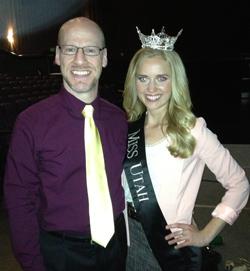On Monday, there was a foofooraw on the Internet about the Miss USA pageant, when Miss Utah stumbled on a question much to the derision of online critics. As it happens, I was recently thinking about beauty pageants because of a talk I gave in Utah, where, coincidentally, I met the Miss Utah from the Miss America Pageant (to be clear, a different woman than the one in the recent Q-and-A kerfuffle). This seems like as good a time to write about it as any.
In April I was in Salt Lake City to visit the Clark Planetarium on the occasion of its 10th anniversary. I had a lovely time, in no small part due to the care and handling by director Seth Jarvis and public relations guru Lindsie Smith. If you’re ever in Salt Lake City, you should pay Clark a visit.
At the planetarium I gave my “Death from the Skies!” talk—all about asteroid impacts and how to avoid them—to a crowd of more than 300 folks, and they seemed to enjoy it. I also got to briefly meet a lot of them while signing books, which is always fun. I think my favorite parts were when a young boy told me he wanted to be a “Martian geologist,” and a group of young men and women were there who were going to the state science fair in May. There’s nothing like seeing the next generation getting fired up about science. That’s the Bernoulli effect above my wings.
It was while I was at the planetarium that I also met Kara Arnold, the current Miss Utah for the Miss America Pageant, who ran her pageant platform on improving STEM (science, technology, engineering, and math) education and encouraging women and girls to enter STEM career paths. She majored in biochemistry in college and is currently attending medical school (which is on hold for the year she’s Miss Utah). She’s smart and approachable and gave a brief inspiring talk about her work to the audience before I went onstage.
While listening to her talk to the audience about STEM support, I found myself conflicted; I’m not a fan of pageants, given their objectification of women, and I suspect she and I would disagree over other issues as well. On the other hand, Arnold is performing a wonderful service, traveling around Utah and the country promoting science the way she does. For that I’m very grateful. She’s probably doing as much or more good in the name of science than a thousand other people her age.
As she spoke, I was struck by how much I travel to talk about science and how overwhelmingly supportive people are of it. It’s a selection bias, I know: Those folks are coming to hear an astronomy talk, and many are predisposed to looking at reality through the lens of science.
Still, I suspect a substantial fraction of the people who hear me talk would disagree with me strongly on many issues. Not necessarily scientific ones, but things like gay rights, reproductive rights, and so on.
But while I’m there talking to them, those issues aren’t important. Not right then, not at that specific time. What’s important is promoting science and getting more people to think critically. And although I might not be comfortable with the opinions or values some people may hold, or they of mine, the fact of the matter is it’s possible to come together on some issues, despite our differences. And who knows? Maybe some of the lessons on how to analyze a problem, how to think about an issue, will spill over from one area to another.
It’s worth remembering that. I will always fight for science and against anti-science when I have to, but I will always bear in mind that not everyone who disagrees with me on other issues is the enemy. Reality is the ultimate big tent.
